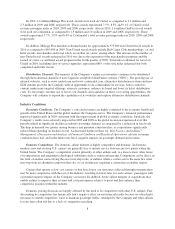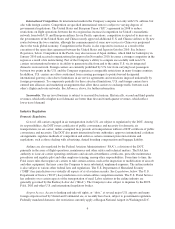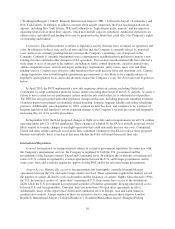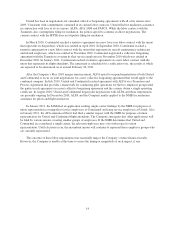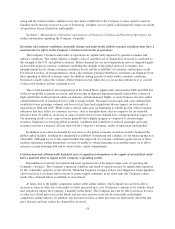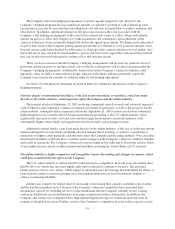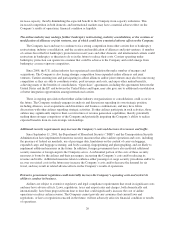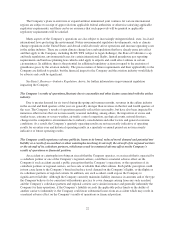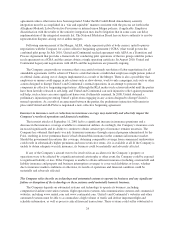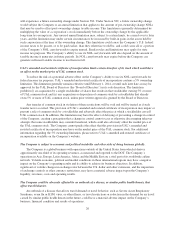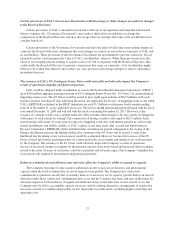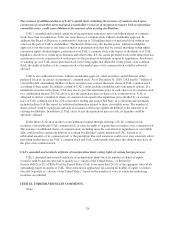United Airlines 2010 Annual Report Download - page 20
Download and view the complete annual report
Please find page 20 of the 2010 United Airlines annual report below. You can navigate through the pages in the report by either clicking on the pages listed below, or by using the keyword search tool below to find specific information within the annual report.rating and the current market conditions may also make it difficult for the Company to raise capital to meet its
liquidity needs and may increase its cost of borrowing. A higher cost of capital could negatively impact its results
of operations, financial position and liquidity.
See Item 7, Management’s Discussion and Analysis of Financial Condition and Results of Operations, for
further information regarding the Company’s liquidity.
Economic and industry conditions constantly change and unfavorable global economic conditions may have a
material adverse effect on the Company’s business and results of operations.
The Company’s business and results of operations are significantly impacted by general economic and
industry conditions. The airline industry is highly cyclical, and the level of demand for air travel is correlated to
the strength of the U.S. and global economies. Robust demand for our air transportation services depends largely
on favorable general economic conditions, including the strength of the global and local economies, low
unemployment levels, strong consumer confidence levels and the availability of consumer and business credit.
For leisure travelers, air transportation is often a discretionary purchase that those consumers can eliminate from
their spending in difficult economic times. In addition, during periods of unfavorable economic conditions,
businesses usually reduce the volume of their business travel, either due to cost-savings initiatives or as a result
of decreased business activity requiring travel.
The overall demand for air transportation in the United States significantly decreased in 2008 and 2009 due
to the severe global economic recession, and this decline in demand disproportionately reduced the volume of
high-yield traffic in the premium cabins on domestic and international flights, as many business travelers either
curtailed their travel or purchased lower yield economy tickets. Decreases in passenger and cargo demand that
resulted in lower passenger volumes and lower ticket fares had a significant adverse impact on our results of
operations in 2008 and 2009. While some economic indicators are beginning to exhibit growth, other economic
indicators that may reflect an economic recovery, such as unemployment, may not improve for an extended
period of time. In addition, decreases in cargo revenues due to lower demand have a disproportionate impact on
our operating results as our cargo revenues generally have higher margins as compared to our passenger
revenues. Stagnant or worsening global economic conditions that contribute to reduced passenger and cargo
revenues may have a material adverse effect on the Company’s revenues, results of operations and liquidity.
In addition to its effect on demand for our services, the global economic recession severely disrupted the
global capital markets, resulting in a diminished availability of financing and a higher cost for financing that was
obtainable. Although access to the capital markets has improved, if economic conditions again worsen or these
markets experience further disruptions, we may be unable to obtain financing on acceptable terms (or at all) to
refinance certain maturing debt and to satisfy future capital commitments.
Continued periods of historically high fuel costs or significant disruptions in the supply of aircraft fuel could
have a material adverse impact on the Company’s operating results.
Expenditures for aircraft fuel and related taxes represent one of the largest single costs of operating the
Company’s business. The Company’s financial condition and result of operations may be significantly impacted
by the availability and price of aircraft fuel. While the Company arranges to have fuel shipped on major pipelines
and stored close to its major hub locations to ensure supply continuity in the short term, the Company cannot
predict the continued future availability of aircraft fuel.
At times, due to the highly competitive nature of the airline industry, the Company has not been able to
increase its fares or other fees sufficiently to offset increased fuel costs. Fuel prices continue to be volatile which
may negatively impact the Company’s liquidity in the future. The Company may not be able to increase its fares
or other fees if fuel prices rise in the future and any such increases may not be sustainable in the highly
competitive airline industry. In addition, any increases in fares or other fees may not sufficiently offset the fuel
price increase and may reduce the demand for air travel.
18


